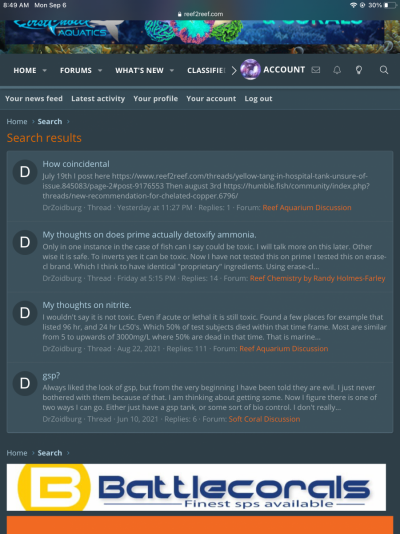(Aob) bacteria that is^
Navigation
Install the app
How to install the app on iOS
Follow along with the video below to see how to install our site as a web app on your home screen.
Note: This feature may not be available in some browsers.
More options
You are using an out of date browser. It may not display this or other websites correctly.
You should upgrade or use an alternative browser.
You should upgrade or use an alternative browser.
My thoughts on nitrite.
- Thread starter DrZoidburg
- Start date
- Tagged users None
Dr. Zoidberg
I’m watching some of the ammonia and nitrite and fish disease posts you’re making and they dont reflect any feedback given to you in the last few months posts. If you would consider buying a seneye, tuning it, and running cycle experiments with it then your offers for cycles will streamline and you can report changes to cycling outcomes you directly observed, you’ll have digital logs that can relayed.
I’m watching some of the ammonia and nitrite and fish disease posts you’re making and they dont reflect any feedback given to you in the last few months posts. If you would consider buying a seneye, tuning it, and running cycle experiments with it then your offers for cycles will streamline and you can report changes to cycling outcomes you directly observed, you’ll have digital logs that can relayed.
Last edited:
So what if its based on a cartoon? That has nothing to do with who I am or what I know. Which you don't know. When someone says I don't think doesn't mean that it is not in the case of gill flukes.(other unrelated thread) I'm sorry you don't understand the context of this arguement. Which even one of your heros say above possible exposure. As far as I see no one has a real defense to this arguement I make. Including all parties here. Also note this is heavy on research papers. From other than me. Why you disregard someone's other than my info who worked at a fish farm is also naive. You realize that to own a fish farm for a food source. There are so many regulations it would make your head spin. As well possibly millions in fish at stake. I would take their word over yours any day. Stop trolling on people, giving people false, and dangerous information. Like "ammonia" thread the other day. You were so quick to push your propaganda war and call it a test misread.(possible) While someone mentioned to test source water. (which is a great idea) Proved that his source water had it. So you say oh "fish seem to be tolerating it". Just plain bad.
Last edited:
@brandon429 I would like to apologize for above as I was hungover this morning. The point here is possible implications, possibilities of this. (largely unknown) You dragged me into a conversation in another thread. Delayed notifications by over a week. I was going to just reply, then I thought why not make a thread. I don't care about likes. I have been here for about 3 months with a lot of time off in between. Just want to give possible suggestions or answers. I was content in doing that before.(first thread here other than gsp which has no big hits) I will be willing to admit when I am wrong, and if I didn't know something, or just did not want to reply I would not. Scientists disagree on things every day, and every day they change definitions on things. "seneye wielding chemists" like you say will prove none of this. Doing it that way is only going to provide numbers, possible correlations and observation. Documents here for a middle of the road fish. Could very well indicate that people need to not throw out test kits or ignore nitrite. (imo many reasons why) Like said above this would really need lab results, and more legit studies. This thread is not about cycling, bottled bacteria sales, or test kits. Only my thoughts
checking troubleshoots here using factors of cycling, nitrite is part of cycling etc
and disease focus

 www.reef2reef.com
www.reef2reef.com
and disease focus

EMERGENCY - Cycling stage problem. Please help!
Hi! I’ve started a saltwater tank on 14th August and I have some strage problems with it. I’ve added 25kg of live rock and 20 kg of live sand and some nitrifying bacteria. I didn’t added any amonnia source after that because I thinked that some of the organic stuff on those rock will break down...
 www.reef2reef.com
www.reef2reef.com
Last edited:
looks good to me
I didn't say anything about nitrite in that thread you linked. Think I may do a my thoughts on...thread next
It was important to see the public trend on lack of bacteria where there wasn't any + omitting all information regarding fish disease during the assist, or things that cause test misreads. this highlights two great market-impacting errors going on in the hobby.
when I read the four threads you’ve made on reef2reef it makes me wonder what your goal is
if I look up and read the top two below I become amazed

when I read the four threads you’ve made on reef2reef it makes me wonder what your goal is
if I look up and read the top two below I become amazed

Last edited:
You’d want to make friends with Taricha and Dan, so that they give you free reef tank chemistry which is reliable and profoundly well written if we click on either of their find all threads page.
Reading what they write is like reading a miniature plos blurb isn’t it. They write clearly and with clear supporting data relevant to the study at hand, it’s a shocking compare and contrast when they write things about reef chemistry.
Reading what they write is like reading a miniature plos blurb isn’t it. They write clearly and with clear supporting data relevant to the study at hand, it’s a shocking compare and contrast when they write things about reef chemistry.
Last edited:
what you did to Taricha's work thread in the chemistry forum I find concerning. I can't understand why you'd still post procedural info opposite to his, in his own study thread.
Last edited:
Dr. Zoidberg
post your concerns about chemistry forum threads here, we can review your statements on Prime or other aspects you want to discuss
post your concerns about chemistry forum threads here, we can review your statements on Prime or other aspects you want to discuss
Last edited:
- Joined
- Dec 28, 2016
- Messages
- 22,763
- Reaction score
- 21,918
this seems to be the thing that some people here missing - and perhaps I'm missing the point as well - but - I was thinking the point of your article was to show how increasing levels of Nitrite can suggest a problem. As compared to the issue that nitrite itself is 'definitely' toxic. On the other hand, no one has done studies on low-level nitrite levels vis a vis longer-term toxicity. I don't get the discussion or argument here frankly. The question I would like to know is - 'does nitrite testing help manage an aquarium'. Not does 2 ppm Nitrite kill something or not.I would love that people use the phrase not acute toxic when they refer to results from LC-50 tests. These tests say nothing about sublethal damage, stress response or death during long exposure. We do not know anything about this. And we do not know anything about other organisms response to nitrite. I maybe know that this or this organism manage - let us say - 1 ppm NO2 but during the same time that or that organism was not so successful. Was this because of the nitrite level or something else - we can´t know that
We are also talking about system that´s not fully cycled and there many starts with high concentrations of ammonia - if you start with 5 ppm NH4 (as I have seen in threads) - it means 3,9 ppm NH4 -N and fully converted to NO2 -> 3,9 NO2-N = 3,28*3,9 NO2 -> 12.8 ppm if the second step is stalled.) You read 0 ammonia and in order to verify the first step - new adding of ammonia - and nitrite can rise higher and higher if second step is stalled
I was among these that for 15 - 20 years ago was fighting for the understanding that nitrite was not as acute toxic for saltwater fish as it was for freshwater fish. We used small amounts of chloride in our freshwater aquariums if we get high nitrite levels. However - too high levels of nitrite (above 0.05 ppm IMO) indicate disturbance in the nitrification cycle and for me - a well working nitrification cycle is important for the whole system.
But this has lead to people start to think that the nitrification cycle is over when the first step has started - NH3/NH4 -> NO2. It has also lead to that many people says - do not measure nitrite. It has also lead to the believing that in a fully cycled tank - there is no nitrite. IMO - nitrite measurements is one of the best tools you have in order to understand the status of your aquarium. The NO2 -> NO3 is one of the most sensitive bacterial transformations we have in saltwater - it is very oxygen dependent, it is sensitive for antibacterial chemicals, it sensitive to excessive growth of heterotrophic bacteria and so on. With a good knowledge of your normal nitrite concentrations you can use these test as an early warning tool if the system goes south in some cases. IMO - Nitrite test are also among those tests that work good and normally rather accurate - even hobby tests.
I use a system to start my aquariums there I never get any nitrite spikes at all - I use fish as ammonia producer and amount of feed as regulating factor. I do not know if it is therefore I do not get any ugly phases or other problems when i start the aquariums. I would not panic (for my fish) if I read 1 or 2 ppm nitrite in my aquarium - instead working steady to get the nitrification process to work - but if I read that in a fishless system - I would never put a fish in that tank before I fixed the nitrification process fully out.
If you try to manage a low nitrate system - knowledge about your nitrite levels is very important because in most test - nitrite interfere with the nitrate readings.
Sincerely Lasse
- Joined
- Dec 28, 2016
- Messages
- 22,763
- Reaction score
- 21,918
its not 'his thread' - its a discussion board. If he doesn't want it discussed - by people that agree (or disagree with him) - he shouldn't post it. If I post a thread its not 'mine' its public.what you did to Taricha's work thread in the chemistry forum I find concerning. I can't understand why you'd still post procedural info opposite to his, in his own study thread.

Hmmmm.I wouldn't say it is not toxic. Even if acute or lethal it is still toxic. Found a few places for example that listed 96 hr, and 24 hr Lc50's. Which 50% of test subjects died within that time frame. Most are similar from 5 to upwards of 3000mg/L where 50% are dead in that time. That is marine fish. The safer ranges from less than .5mg/L to 15 mg/L for inverts and less than 5mg/L to 50mg/L fish in one article. Safer though still toxic. I have seen on here some that let it go to over 10mg/L. Saying one would never get to toxic levels is just false. Temperature matters cold water species are much more sensitive. To add when the temperature rises the toxicity increases to nearly double in most at usual aquarium temperatures because the fish need to take in more oxygen. It is also another unknown in common kept fish whether some fish take more nitrite via their stomach than through gills. Which would negate the effects chloride has on making nitrite absorption rates into body safer. Not to mention other variables or chemical reactions that increase toxicity as well as side effects caused even if they did not die. Some of the places I found only listed a few commonly kept fish and inverts. None were very comprehensive lists. Realistically would one want to risk a several hundred dollar fish to a possible 50% chance of survival right out of the gate without solid data? Even risk a 15% chance on top of all the other probabilities? Whether it be interfering with biological functions, increased susceptibility to disease/parasites or outright death. I would be a lot more convinced if anyone can find me Lc2's (2%) or lowest observed adverse effect levels/concentration. I would like the greatest chance of survival, long life, and good health for my pets. Until then I will personally test and control nitrite when cycling new or dealing with die off cycles.
Sort of another thing I'm batting at. How do we know that a life time of even intermittent exposures does not cause harm long term, shorter life, disease outbreaks etc.. Only stating it should be tested and adjusted/kept in check respectfully. The nitrite is "non-toxic" community saying based on a limited list of food use fisheries species is not us reef keepers as a whole. Where a few of things we do keep even though studies are limited, can be shown to be effected. What about a comprehensive list of fish, corals, inverts, sponges, or anything so many people keep. No such list exists. People say they care about their pets but ignore possibility, and in some cases near certainty. Why not test occasionally. It's so easy and takes no time. To your last question I believe my answer would be yes it helps. Some reasons we may know why, and some not.this seems to be the thing that some people here missing - and perhaps I'm missing the point as well - but - I was thinking the point of your article was to show how increasing levels of Nitrite can suggest a problem. As compared to the issue that nitrite itself is 'definitely' toxic. On the other hand, no one has done studies on low-level nitrite levels vis a vis longer-term toxicity. I don't get the discussion or argument here frankly. The question I would like to know is - 'does nitrite testing help manage an aquarium'. Not does 2 ppm Nitrite kill something or not.
- Joined
- Dec 28, 2016
- Messages
- 22,763
- Reaction score
- 21,918
The one response about the whole testing thing is - lets say you do a nitrite one week and its 0 - and the next its .5. Would you do something different - if everything in the tank looks good? One thing I think reefers do incorrectly - is too much testing. Because - a certain percent of tests by definition will be 'abnormal' - and then they do something about those results. I tend to test when I see a problem - and in the meantime - I do everything I can do to avoid a problem. I.e. - I would never do an ICP test. I test Nitrate and PO4 perhaps ever 3-4 months. Alkalinity once a month Ca at the same time.Sort of another thing I'm batting at. How do we know that a life time of even intermittent exposures does not cause harm long term, shorter life, disease outbreaks etc.. Only stating it should be tested and adjusted/kept in check respectfully. The nitrite is "non-toxic" community saying based on a limited list of food use fisheries species is not us reef keepers as a whole. Where a few of things we do keep even though studies are limited, can be shown to be effected. What about a comprehensive list of fish, corals, inverts, sponges, or anything so many people keep. No such list exists. People say they care about their pets but ignore possibility, and in some cases near certainty. Why not test occasionally. It's so easy and takes no time. To your last question I believe my answer would be yes it helps. Some reasons we may know why, and some not.
Similar threads
- Replies
- 11
- Views
- 296
- Replies
- 10
- Views
- 294
- Replies
- 1
- Views
- 124
- Replies
- 5
- Views
- 339
- Replies
- 7
- Views
- 143
New Posts
-
Livestock PHYTOPLANKTON AND COPEPOD CULTURE KITS
- Latest: Reef By Steele
-
-



















